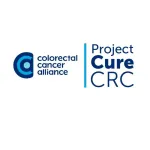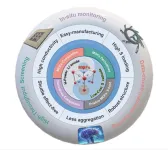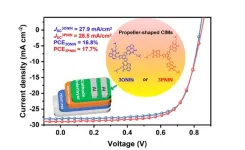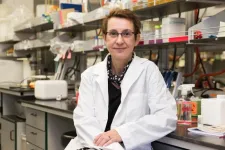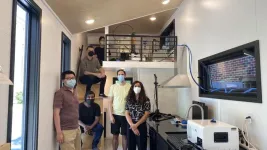(Press-News.org) Every year, over 100 million people worldwide suffer a stroke. Ischemic strokes (cerebral infarction) are the most common, but they can also occur "silently" and therefore often go undetected. This can result in serious illnesses such as dementia, depression or even suicide. In order to determine the risk of stroke at an early stage, Prof. Dr. Olga Golubnitschaja, head of the research group for 3P (predictive, preventive and personalized) medicine at the University Hospital Bonn (UKB), together with the University of Bonn and other authors from 25 institutions from 11 countries, has developed a holistic approach to health risk assessment associated with targeted prevention and individualized treatment algorithms. The research article has now been published in the international journal The EPMA Journal.
The number of strokes has increased worldwide in recent years. "The figures for younger people under 50 are particularly alarming," explains Prof. Golubnitschaja "The number here has doubled within three years. There are also undetected cases. It is estimated that the proportion in the population is around 14 times greater than the proportion of diagnosed cases to which reactive medical measures are applied."
Paradigm shift from "reactive" to "predictive" medicine required
The researchers have therefore developed an innovative concept that aims to help prevent strokes and focuses on "predictive" rather than "reactive" medicine. In other words, the aim is to predict the probability of illness and take measures based on this to reduce the risk of illness instead of reacting to an already established illness. "The development from a predisposition to a clinically proven stroke or cardiac arrest does not happen overnight, but over a period of years. Therefore, the time for targeted prevention is ample and should be used cost-effectively in favor of susceptible population groups. There are various risk factors and parameters that indicate this and which can be investigated in advance," says Prof. Golubnitschaja. Together with her 3PM research group at the University of Bonn and the international 3PM consortium (European Association for Predictive, Preventive and Personalsed Medicine, EPMA), she has developed a non-invasive, painless approach that uses a health risk assessment through tear fluid, mitochondria as a vital biosensor and AI-supported data interpretation.
Mitochondria serve as natural biosensors
"Mitochondria are present in every cell of our body and act as a vital partner and strict observer of whether everything runs smoothly with our health," explains Prof. Golubnitschaja "If something is wrong, the mitochondria report through mitophagy and signal to all systems that we have a health problem. These signals can be measured objectively using liquid biopsies." The non-invasive and painless collection and analysis of tear fluid allows an individualized profile of the patient to be created.
Supplemented by additional routine questioning during a regular check-ups, for example including family predispositions, lifestyle, sleeping and eating habits, a series of parameters for individualized risk assessment is created. Due to the large number of parameters recorded, the researchers are using artificial intelligence (AI) to develop algorithms that enable a robust health risk assessment, predictive diagnostics and thus the development of targeted preventive measures.
"The implementation of the 3PM innovation saves both human and financial resources," says Prof. Golubnitschaja "The estimated global economic burden of strokes is over 891 billion US dollars every year. This is an economic disaster that we want to counteract through predictive medicine by using our holistic approach to prevent strokes before they occur."
Publication: Olga Golubnitschaja et al.; The paradigm change from reactive medical services to 3PM in ischemic stroke: A holistic approach utilising tear fluid multi-omics, mitochondria as a vital biosensor and AI-based multi-professional data interpretation; DOI: https://doi.org/10.1007/s13167-024-00356-6
END
Determine stroke risk at an early stage using tear fluid, mitochondria and AI-based data
Experts present holistic predictive approach for preventive and individualized treatment
2024-02-27
ELSE PRESS RELEASES FROM THIS DATE:
Researchers look at environmental impacts of AI tools
2024-02-27
OAK BROOK, Ill. – As artificial intelligence (AI) is increasingly used in radiology, researchers caution that it’s essential to consider the environmental impact of AI tools, according to a focus article published today in Radiology, a journal of the Radiological Society of North America (RSNA).
Health care and medical imaging significantly contribute to the greenhouse gas (GHG) emissions fueling global climate change. AI tools can improve both the practice of and sustainability in radiology through optimized imaging protocols resulting in shorter scan times, improved scheduling ...
New consortium MetrANOVA to create a measurement and analysis toolbox for research and education networks worldwide
2024-02-27
February 27 — Five of the world’s leading research and education (R&E) networking organizations have joined forces to form MetrANOVA, a consortium for Advancing Network Observation, Visualization, and Analysis. Together, founding members Energy Sciences Network (ESnet), GÉANT, GlobalNOC at Indiana University, Internet2, and Texas Advanced Computing Center (TACC) operate and connect a dizzying number of national, regional, and local R&E networks — yet representing a portion of the decentralized fabric linking scientific researchers in hundreds of countries ...
Drug-resistant tuberculosis responds rapidly to bedaquiline-based second-line therapy
2024-02-27
Patients who have drug-resistant tuberculosis (TB) have a similar microbiological response to bedaquiline-based second-line medications as patients with drug-sensitive TB taking first-line regimens, according to researchers at Weill Cornell Medicine in New York and GHESKIO Centers in Haiti. Second-line medications are those that are given when one or more of the drugs given first for the disease are not effective. The research could have implications for shortening the duration of treatment for drug-resistant TB, which currently ...
Colorectal Cancer Alliance announces Request for Proposals (RFP) as it launches the largest-ever CRC research investment totaling tens of millions
2024-02-27
In an effort to expedite its life-saving work, the Colorectal Cancer Alliance (Alliance) Project Cure CRC initiative is excited to open its Request for Proposals (RFP). Tens of millions of dollars will be available to researchers from around the world whose work aims to expedite colorectal cancer (CRC) research to a curable science. Beginning March 1, the program is accepting applications for one to three-year projects from qualifying professionals at research-based institutions and private companies. Priority will be given to proposals that focus on high-risk/high-reward projects to accelerate new CRC therapies and technologies from bench to bedside.
The ...
Reaching federal youth sport participation goal could save US billions of dollars
2024-02-27
First-of-its-kind study suggests increasing the percentage of youth in the United States who participate in sports to meet a Healthy People 2030 goal could improve children’s physical and mental health and save $80 billion.
Achieving the Healthy People 2030 youth sports participation goal could save the United States $80 billion in direct medical costs and productivity losses and deliver over 1.8 million more quality years of life to Americans, according to a study that will be published on Feb. 27 in the American Journal of Preventive Medicine.
Every decade since 1980, Healthy People has provided science-based, 10-year national objectives and ...
Improving lithium-sulfur batteries with metal organic framework-based materials
2024-02-27
Current lithium-ion battery technology does not have the energy density necessary to meet the demands for renewable energy. In theory, lithium-sulfur batteries could be a viable alternative with a higher specific capacity and energy density. However, sulfur has disadvantages that currently limit its practical adoption.
A comprehensive review published in Nano Research on February 8 outlines how metal organic frameworks-based cathode materials could improve the performance of lithium-sulfur batteries, making them a practical alternative to lithium-ion batteries.
“The ...
An alternate arrangement: how a propeller-shaped isomer can improve organic solar cells
2024-02-27
Imagine technology as a race car speeding down a track – it can only go as fast as its engine allows. But just when it seemed like organic solar cells hit a roadblock, along comes 3PNIN, a game-changing molecule shaped like a propeller, ready to turbocharge their progress and break through barriers.
Organic solar cells (OSCs) represent the pinnacle of renewable energy, yet certain components have fallen significantly behind the trajectory of ongoing development. Particularly, cathode interfacial materials (CIMs) have failed to sustain ...
Binghamton University biologist named Fellow of American Academy of Microbiology
2024-02-27
BINGHAMTON, N.Y. -- Binghamton University, State University of New York researcher Karin Sauer is among 65 scientists elected as Fellows of the American Academy of Microbiology this year.
Fellows are elected by their peers based on their scientific achievements and original contributions to the field of microbiology.
Sauer’s lab aims to find ways to control communities of bacteria called biofilms and to curb their extraordinary resistance to antimicrobial agents. The team’s findings could have an impact on a wide range of healthcare practices, from ear infections to wound care.
“I’m honored and ...
Community culture shapes ceramics
2024-02-27
Archeologists have long used the shapes and styles of pottery as a proxy for ancient cultures. But how does the cultural alignment of ceramic forms arise? To explore this question, Tetsushi Nonaka and colleagues asked 21 potters in three different communities—one in France in Bourgogne and two in India in Bulandshahar district, Uttar Pradesh—to throw pots with the same unfamiliar shapes. One of the Indian pottery workshops was Hindu, the other was Muslim. In each community, several different potters tried the shapes. Through careful measurement, the authors were able to determine ...
Nano-sized particles emitted from gas stoves
2024-02-27
A study quantifies the emission of extremely tiny particles by gas stoves and finds that the particles could harm human health. Airborne nanoparticles between 1–3 nm, referred to as nanocluster aerosol or NCA, are known to be bioactive and toxic, but measuring such minute particles has been a challenge. Brandon E. Boor and colleagues measured indoor NCA during propane gas cooking in the Purdue zero Energy Design Guidance for Engineers (zEDGE) test house using a novel instrument. Combining measurement data with the general dynamic equation for aerosols, the authors were able to characterize the production and behavior ...
LAST 30 PRESS RELEASES:
Increasing the number of coronary interventions in patients with acute myocardial infarction does not appear to reduce death rates
Tackling uplift resistance in tall infrastructures sustainably
Novel wireless origami-inspired smart cushioning device for safer logistics
Hidden genetic mismatch, which triples the risk of a life-threatening immune attack after cord blood transplantation
Physical function is a crucial predictor of survival after heart failure
Striking genomic architecture discovered in embryonic reproductive cells before they start developing into sperm and eggs
Screening improves early detection of colorectal cancer
New data on spontaneous coronary artery dissection (SCAD) – a common cause of heart attacks in younger women
How root growth is stimulated by nitrate: Researchers decipher signalling chain
Scientists reveal our best- and worst-case scenarios for a warming Antarctica
Cleaner fish show intelligence typical of mammals
AABNet and partners launch landmark guide on the conservation of African livestock genetic resources and sustainable breeding strategies
Produce hydrogen and oxygen simultaneously from a single atom! Achieve carbon neutrality with an 'All-in-one' single-atom water electrolysis catalyst
Sleep loss linked to higher atrial fibrillation risk in working-age adults
Visible light-driven deracemization of α-aryl ketones synergistically catalyzed by thiophenols and chiral phosphoric acid
Most AI bots lack basic safety disclosures, study finds
How competitive gaming on discord fosters social connections
CU Anschutz School of Medicine receives best ranking in NIH funding in 20 years
Mayo Clinic opens patient information office in Cayman Islands
Phonon lasers unlock ultrabroadband acoustic frequency combs
Babies with an increased likelihood of autism may struggle to settle into deep, restorative sleep, according to a new study from the University of East Anglia.
National Reactor Innovation Center opens Molten Salt Thermophysical Examination Capability at INL
International Progressive MS Alliance awards €6.9 million to three studies researching therapies to address common symptoms of progressive MS
Can your soil’s color predict its health?
Biochar nanomaterials could transform medicine, energy, and climate solutions
Turning waste into power: scientists convert discarded phone batteries and industrial lignin into high-performance sodium battery materials
PhD student maps mysterious upper atmosphere of Uranus for the first time
Idaho National Laboratory to accelerate nuclear energy deployment with NVIDIA AI through the Genesis Mission
Blood test could help guide treatment decisions in germ cell tumors
New ‘scimitar-crested’ Spinosaurus species discovered in the central Sahara
[Press-News.org] Determine stroke risk at an early stage using tear fluid, mitochondria and AI-based dataExperts present holistic predictive approach for preventive and individualized treatment



